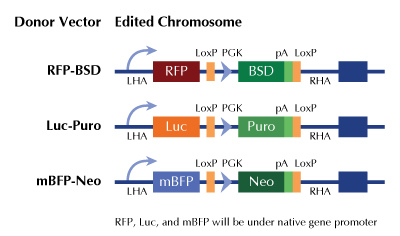Twist1 Mouse Gene Knockout Kit (CRISPR)
CAT#: KN318498BN
Twist1 - mouse gene knockout kit via CRISPR, HDR mediated
Functional Cassette: GFP-puro Luciferase-Puro RFP-BSD
HDR-mediated knockout kit validation
USD 1,657.00
4 Weeks*
Specifications
| Product Data | |
| Format | 2 gRNA vectors, 1 mBFP-Neo donor, 1 scramble control |
| Donor DNA | mBFP-Neo |
| Symbol | Twist1 |
| Locus ID | 22160 |
| Components |
KN318498G1, Twist1 gRNA vector 1 in pCas-Guide CRISPR vector KN318498G2, Twist1 gRNA vector 2 in pCas-Guide CRISPR vector KN318498BND, donor DNA containing left and right homologous arms and mBFP-Neo functional cassette. GE100003, scramble sequence in pCas-Guide vector |
| Disclaimer | These products are manufactured and supplied by OriGene under license from ERS. The kit is designed based on the best knowledge of CRISPR technology. The system has been functionally validated for knocking-in the cassette downstream the native promoter. The efficiency of the knock-out varies due to the nature of the biology and the complexity of the experimental process. |
| Reference Data | |
| RefSeq | NM_011658 |
| UniProt ID | P26687 |
| Synonyms | bHLHa38; M-Twist; Pde; pdt; Ska10; Ska |
| Summary | Basic helix-loop-helix (bHLH) transcription factors have been implicated in cell lineage determination and differentiation. This gene encodes a bHLH transcription factor that is evolutionarily conserved from invertebrates to humans, and was originally identified in Drosophila as an essential gene involved in early mesoderm development and dorsal-ventral patterning in the embryo. This protein plays a role in cancer by regulating the epithelial-mesenchymal transition (EMT), a process that is critical for metastasis initiation, and promoting tumor progression. Mutations in the human gene are associated with Saethre-Chotzen syndrome (SCS). Mice with heterozygous mutations in this gene exhibit cranofacial and structural defects similar to those seen in human SCS patients. [provided by RefSeq, Sep 2015] |
Documents
| Product Manuals |
| FAQs |
| SDS |
Resources
Other Versions
| SKU | Description | Size | Price |
|---|---|---|---|
| KN318498 | Twist1 - mouse gene knockout kit via CRISPR, HDR mediated |
USD 1,657.00 |
|
| KN318498LP | Twist1 - mouse gene knockout kit via CRISPR, HDR mediated |
USD 1,657.00 |
|
| KN318498RB | Twist1 - mouse gene knockout kit via CRISPR, HDR mediated |
USD 1,657.00 |
|
| KN518498 | Twist1 - KN2.0, Mouse gene knockout kit via CRISPR, non-homology mediated. |
USD 1,657.00 |
|
| GA204498 | Twist1 CRISPRa kit - CRISPR gene activation of mouse twist basic helix-loop-helix transcription factor 1 |
USD 1,657.00 |
{0} Product Review(s)
Be the first one to submit a review






























































































































































































































































 Germany
Germany
 Japan
Japan
 United Kingdom
United Kingdom
 China
China
